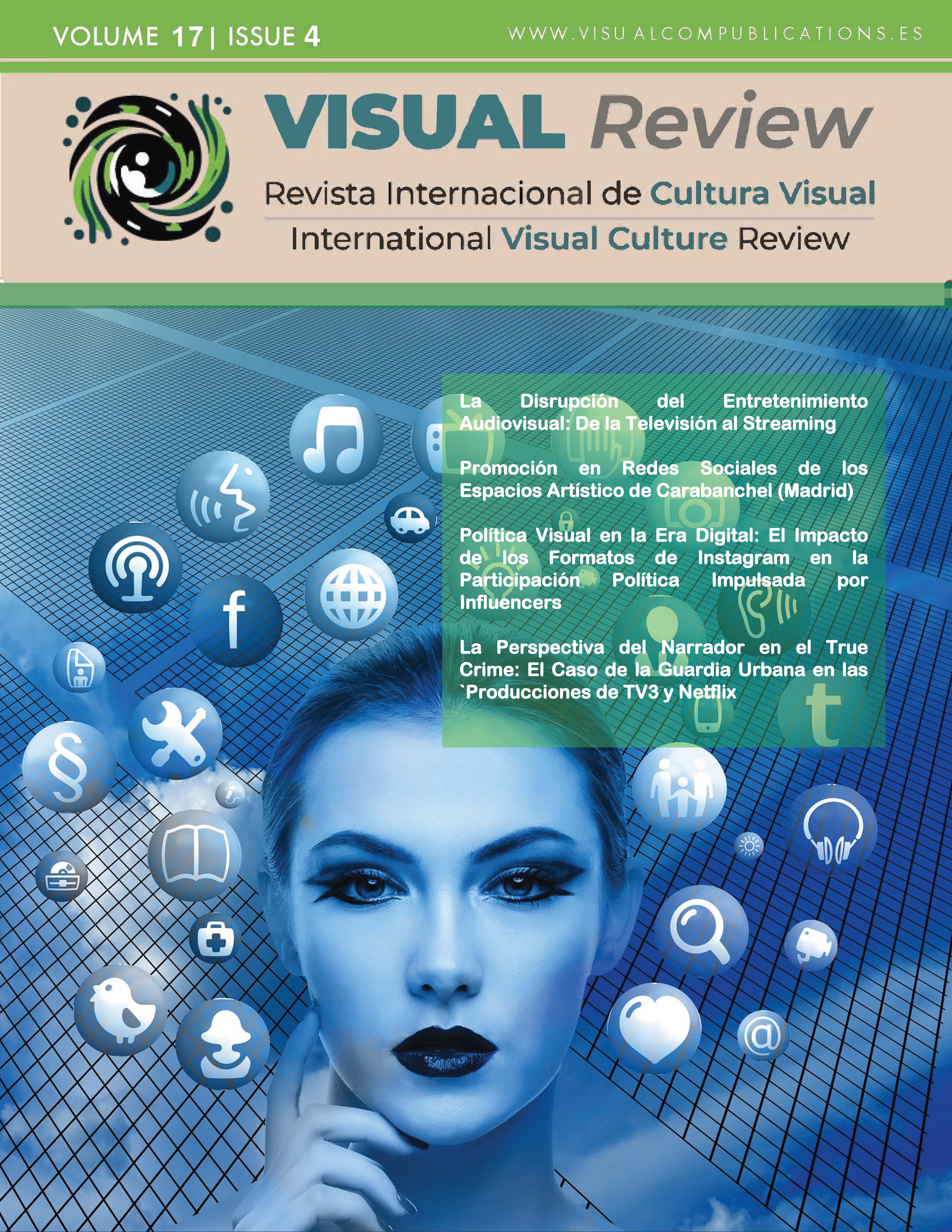Misinformation Disguised as Humor
Deepfakes' Impact on Instagram Trust
DOI:
https://doi.org/10.62161/revvisual.v17.5864Keywords:
Deepfakes, Artificial Intelligence, Trust, Information, Instagram, ChileAbstract
This research analyzes the impact of deepfakes or fake videos generated by artificial intelligence on Instagram's trust, in Concepción, Chile. In addition to analyzing the deepfakes, a focus group and a questionnaire were applied to more than 100 people. Among the results, it stands out that 85.2% of the participants have seen at least one deepfake video on Instagram. When they identify it, more than half of them laugh when they see it. 57.6% admit to doubting its authenticity and 81.4% indicated that deepfakes affect their trust in Instagram.
Downloads
Global Statistics ℹ️
|
601
Views
|
314
Downloads
|
|
915
Total
|
|
References
Ajder, H., Patrini, G., Cavalli, F., Cullen, L., & Deeptrace. (2019). The State of Deepfakes: landscape, threats, and impact. In Deeptrace [Report]. https://regmedia.co.uk/2019/10/08/deepfake_report.pdf
Ballesteros, L., y Ruiz del Olmo, F. (2024). Vídeos falsos y desinformación ante la IA: El deepfake como vehículo de la posverdad. Revista De Ciencias De La Comunicación E Información, 29, 1–14. https://doi.org/10.35742/rcci.2024.29.e294 DOI: https://doi.org/10.35742/rcci.2024.29.e294
Citron, D. (2018, December 11). Deepfakes and the new disinformation war. Stanford CIS. https://cyberlaw.stanford.edu/publications/deepfakes-and-new-disinformation-war/
Citron, D. K., & Chesney, R. (n.d.). Deepfakes and the new disinformation war. Scholarly Commons at Boston University School of Law. https://scholarship.law.bu.edu/shorter_works/76/
Creswell, J. W. (1995). QUALITATIVE INQUIRY AND RESEARCH DESIGN. In Investigación Cualitativa Y Diseño Investigativo. https://academia.utp.edu.co/seminario-investigacion-II/files/2017/08/INVESTIGACION-CUALITATIVACreswell.pdf
Fletcher, R., & Park, S. (2017). The impact of trust in the news media on online news consumption and participation. Digital Journalism, 5(10), 1281–1299. https://doi.org/10.1080/21670811.2017.1279979 DOI: https://doi.org/10.1080/21670811.2017.1279979
García-Ull, F. J. (2021). Deepfakes: el próximo reto en la detección de notícias falsas. Análisis, 64, 103. https://doi.org/10.5565/rev/analisi.3378 DOI: https://doi.org/10.5565/rev/analisi.3378
Hu K, Wang S, Lee D, Liu H (2020c) Mining disinformation and fake news: concepts, methods, and recent advancements. In: Disinformation, misinformation, and fake news in social media. Springer, Berlin, pp 1–19 https://doi.org/10.1007/978-3-030-42699-6_1 DOI: https://doi.org/10.1007/978-3-030-42699-6_1
Hueso, L. (2022). Quién, cómo y qué regular (o no regular) frente a la desinformación. Teoría y realidad constitucional, (49), 199-238. https://dialnet.unirioja.es/servlet/articulo?codigo=8450040 DOI: https://doi.org/10.5944/trc.49.2022.33849
Ibrahim, S. (2024, February 10). Cómo los ‘deepfakes’ están cambiando nuestra visión de la realidad. https://www.swissinfo.ch/spa/ciencia/cómo-los-ultrafalsos-cambian-nuestra-visión-de-la-realidad/46866008
Lazer, D. M. J., Baum, M. A., Benkler, Y., Berinsky, A. J., Greenhill, K. M., Menczer, F., Metzger, M. J., Nyhan, B., Pennycook, G., Rothschild, D., Schudson, M., Sloman, S. A., Sunstein, C. R., Thorson, E. A., Watts, D. J., & Zittrain, J. L. (2018). The science of fake news. Science, 359(6380), 1094–1096. https://doi.org/10.1126/science.aao2998 DOI: https://doi.org/10.1126/science.aao2998
Martínez, E. (2023). Desinformación y fake news en TikTok: técnicas para su detección y prevención. https://oa.upm.es/76481/
Molina, O. (2024). Dissonance between technological transformation and journalistic ethics: A critical discussion of the impact of artificial intelligence on the media. adComunica Revista Científica De Estrategias Tendencias E Innovación En Comunicación, 91–114. 4 https://doi.org/10.6035/adcomunica.8002 DOI: https://doi.org/10.6035/adcomunica.8002
Sierra Bravo, R. (1992). Técnicas de investigación social: teoría y ejercicios (p. 33)
Vaccari, C., & Chadwick, A. (2020). Deepfakes and Disinformation: Exploring the impact of synthetic political video on deception, uncertainty, and trust in news. Social Media + Society, 6(1). https://doi.org/10.1177/2056305120903408 DOI: https://doi.org/10.1177/2056305120903408
Wardle, C., y Derakhshan, H. (2017). Desorden de la información: Hacia un marco interdisciplinario para la investigación y la formulación de políticas. Consejo de Europa. https://rm.coe.int/information-disorder-toward-an-interdisciplinary- framework-for-researc/168076277c
Wagner, A. [. (2024, September 13). Desinformación en la era digital. DIGITAL.CSIC. http://hdl.handle.net/10261/367658
Zuboff, S. (2019). The Age of Surveillance Capitalism: The Fight for a Human Future at the New Frontier ofPower (PublicAffairs,Ed.).ilustrada https://www.hbs.edu/faculty/Pages/item.aspx?num=56791
Downloads
Published
How to Cite
Issue
Section
License
Copyright (c) 2025 Authors retain copyright and transfer to the journal the right of first publication and publishing rights

This work is licensed under a Creative Commons Attribution-NoDerivatives 4.0 International License.
Those authors who publish in this journal accept the following terms:
-
Authors retain copyright.
-
Authors transfer to the journal the right of first publication. The journal also owns the publishing rights.
-
All published contents are governed by an Attribution-NoDerivatives 4.0 International License.
Access the informative version and legal text of the license. By virtue of this, third parties are allowed to use what is published as long as they mention the authorship of the work and the first publication in this journal. If you transform the material, you may not distribute the modified work. -
Authors may make other independent and additional contractual arrangements for non-exclusive distribution of the version of the article published in this journal (e.g., inclusion in an institutional repository or publication in a book) as long as they clearly indicate that the work was first published in this journal.
- Authors are allowed and recommended to publish their work on the Internet (for example on institutional and personal websites), following the publication of, and referencing the journal, as this could lead to constructive exchanges and a more extensive and quick circulation of published works (see The Effect of Open Access).














